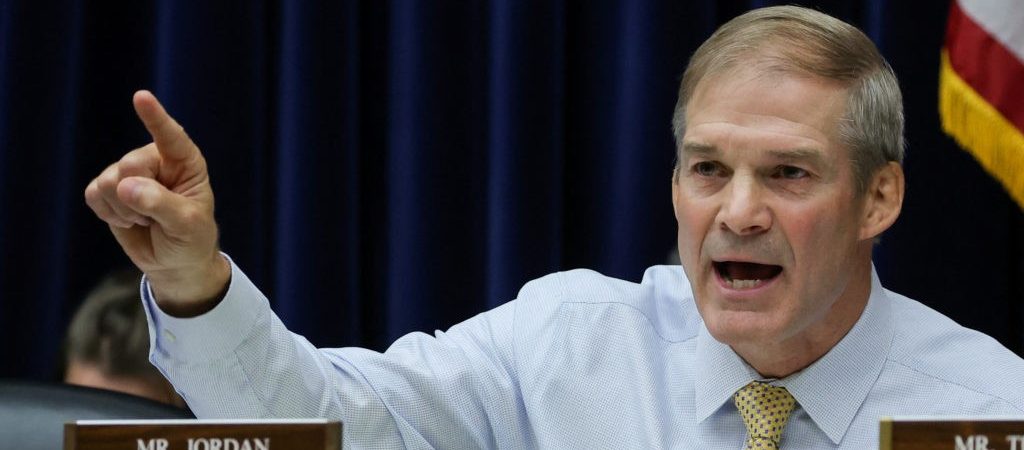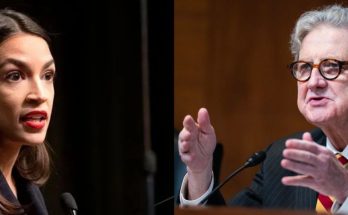BREAKING NEWS: Jim Jordan’s “Born in the USA” Bill Sparks Nationwide Outrage — Chaos Erupts in Congress as Lawmakers and the Public Debate the Limits of Patriotism! — Could This Controversial Move Threaten Dual-Citizen Politicians? — What Impact Could It Have on Elections, Power, and Washington Drama for Years to Come?
When Representative Jim Jordan unveiled his “Born in the USA” bill, Washington—and much of the country—was thrown into a political tornado. The legislation, which seeks to restrict eligibility for Congress and the presidency to individuals born on U.S. soil, immediately polarized the nation. Supporters hailed it as a bold defense of American patriotism. Critics, however, warned that it was a power grab disguised as principle, designed to redraw the political landscape in ways no one could have predicted.
For months, whispers about dual-citizen lawmakers had circulated quietly behind Capitol Hill doors. Now, with Jordan’s proposal on the table, those whispers became a full-throated public conversation. Questions poured in from every corner: Who could be affected? Which influential politicians might be forced to rethink their positions? And which foreign governments might quietly panic as the implications of this legislation became apparent?
The stakes could not be higher. In a Washington already rife with political drama, the “Born in the USA” bill threatens to upend established alliances, spark fierce partisan battles, and ignite a national debate about what patriotism truly means in modern America.
The Bill That Shook Capitol Hill
Jordan, known for his combative style and unwavering conservative principles, delivered a forceful message during the press conference announcing the bill. “America deserves leaders whose first and only allegiance is to this country,” he said. “If you hold citizenship elsewhere, you cannot be trusted with our highest offices.”
While simple in its wording, the implications of the statement were seismic. Washington insiders quickly began to speculate on who might be quietly affected. Several sitting members of Congress reportedly began reviewing their records and citizenship documentation, wary of political fallout.
Meanwhile, analysts on cable news programs dissected every angle. “This is more than a bill; it’s a political statement,” said a veteran political commentator. “It forces a question we’ve avoided for years: What does it mean to be fully, undividedly American in government?”
Behind Closed Doors: Capitol’s Reaction
In private meetings, lawmakers expressed mixed feelings. Some applauded Jordan’s audacity. Others, quietly nervous, began calculating the potential consequences for their careers. Staffers whispered that dual-citizen politicians were holding emergency consultations with lawyers to determine whether they could remain in office under the proposed rules.
Even the leadership of both parties was forced to take notice. Reports suggest that committee chairs scheduled urgent closed-door briefings to assess whether the bill could gain traction. Speculation is rampant that if passed, the legislation could trigger resignations, internal investigations, and possibly even legal challenges reaching the Supreme Court.

Public Outcry and Nationwide Debate
The American public quickly weighed in, flooding social media platforms with opinions. Patriotic conservatives hailed Jordan as a defender of American values. Liberals criticized the bill as exclusionary and discriminatory. News outlets were filled with heated panels debating whether dual citizenship in elected office should be treated as a national security risk or dismissed as irrelevant in a globalized society.
Opinion polls released within days of the announcement indicated that roughly 45% of Americans supported the bill, while 40% opposed it, with the remainder undecided. Interestingly, the debate transcended traditional party lines, sparking nuanced discussions among voters about loyalty, transparency, and the responsibilities of elected officials.

Historical Context: Dual Citizenship in American Politics
Jordan’s bill is not the first time dual citizenship has surfaced as a contentious issue. Throughout U.S. history, questions about the allegiances of politicians have arisen, particularly during times of war or national crisis. However, most previous controversies involved isolated instances and were handled discreetly. What makes this bill revolutionary is its broad, public approach: it seeks to apply a strict, uniform standard to all members of Congress and the presidency, rather than addressing specific cases individually.
Legal experts have begun weighing in. Some argue that the Constitution may already implicitly allow such restrictions through clauses about natural-born citizenship for the presidency. Others contend that applying similar restrictions to Congress could be legally challenged as an overreach, potentially igniting years of litigation.
The Global Angle: Foreign Governments on Alert
As Jordan’s announcement reverberated across Washington, some foreign governments reportedly began taking notice. While officials remain tight-lipped, insiders suggest that countries with dual-national ties to U.S. politicians are quietly reassessing their influence networks. Analysts warn that the bill could inadvertently affect diplomatic relations, especially if lawmakers with dual citizenship are forced out or pressured to resign.
“The international implications are real,” said a political analyst who tracks global influence in U.S. politics. “When a foreign government loses access to even one sympathetic policymaker, it can shift the balance of negotiations, trade discussions, and policy alignment.”

Political Strategists Speak
Campaign consultants and political strategists have been working overtime to calculate potential scenarios. Some see an opportunity for Republicans to consolidate power by challenging Democrats with dual citizenship. Others warn that this move could backfire, galvanizing opposition and energizing voters who view the legislation as exclusionary or politically motivated.
Inside the halls of think tanks and policy institutes, debates have been heated. “This isn’t just about law; it’s about optics,” one strategist told reporters. “Passing a law is one thing, but managing public perception is another entirely. Jordan has thrown a gauntlet down, and everyone in D.C. is picking it up.”
Lawmakers Who Could Be Affected
Though Jordan’s team has not released an official list, rumors have swirled about high-profile politicians potentially impacted. Multiple sources indicate that several members of Congress hold dual citizenship with countries including Canada, the United Kingdom, and Germany. Whether these lawmakers will step forward, challenge the legislation, or quietly resign remains unknown.
The suspense has generated a media frenzy. Every press conference, tweet, and public appearance is now scrutinized for hints about dual citizenship status, loyalty, or political maneuvering.

The Constitutional Debate
Legal scholars have jumped into the fray, dissecting the bill clause by clause. One key question is whether Congress has the authority to restrict membership based on birthplace alone. Another debate revolves around equal protection: if the law affects current members retroactively, could it violate constitutional rights?
Some scholars have suggested that a Supreme Court challenge is inevitable, particularly if the bill passes both houses of Congress. Others argue that even a failed attempt will leave a permanent mark on political discourse, changing how Americans view the qualifications of their elected officials.

Media Frenzy and Social Media Explosion
As the bill gained national attention, news cycles exploded. Cable networks ran 24-hour coverage, dissecting potential fallout. Social media hashtags such as #BornInUSA, #DualCitizenDrama, and #JordanBill trended for days. Online polls, opinion pieces, and viral videos contributed to a nonstop stream of analysis, speculation, and heated debate.
Influencers and political commentators weighed in with provocative takes. Some praised Jordan as a modern-day patriot, while others lambasted the legislation as regressive and exclusionary. Memes, reaction videos, and TikTok clips added a viral dimension, keeping the story alive across multiple platforms.
Potential Political Fallout
The ripple effects of the bill are already being felt in unexpected corners of American politics. Dual-citizen politicians are reportedly holding emergency strategy sessions. Campaigns for upcoming elections are recalibrating. Lobbyists are analyzing every angle to see which clients might benefit—or suffer—from the new rules. Even party fundraising efforts could be affected, as donors reassess which politicians are vulnerable to this unprecedented legislation.
Washington insiders suggest that the “Born in the USA” bill could reshape alliances in Congress, redefine party strategy, and ignite political drama that lasts for years.
The Human Element
Amid the political maneuvering, it’s easy to forget that this legislation could have personal consequences. Lawmakers facing dual-citizen scrutiny may experience public pressure, stress, and scrutiny that goes beyond policy debates. Families, staffers, and constituents could be drawn into unexpected controversy. The emotional toll on those affected may be substantial, even as the drama plays out on national television and social media.
Conclusion: The Political Earthquake Continues
Jim Jordan’s “Born in the USA” bill is more than just legislation; it is a political earthquake shaking the foundations of Washington, D.C. With dual-citizen politicians facing scrutiny, foreign governments watching closely, and the public divided on what patriotism truly means, the stakes have never been higher.
Whether the bill passes, fails, or ignites legal challenges that last for years, one thing is clear: the debate about loyalty, citizenship, and eligibility for office has entered the national spotlight—and it is not going away anytime soon.
The country is watching. Washington is holding its breath. And in the heart of this unfolding drama, the question remains: who will stand, who will fall, and how will the definition of American leadership be rewritten forever?



